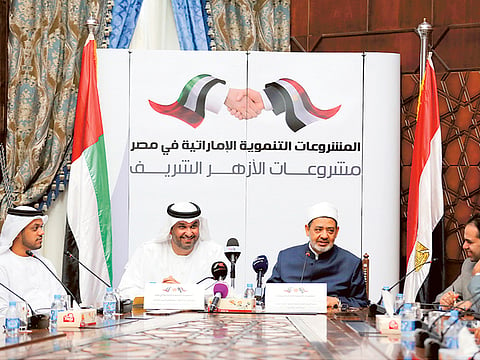Combating extremism? Al Azhar unveils plan
Multi-layer plan includes revising all curricula in the 1,000-year-old institute

Cairo: Egypt’s Al Azhar, one of Islam’s oldest institutes, is working on a multi-layer plan to counter the threat of extremist ideologies, particularly the Daesh phenomena, its chief, Grand Imam Ahmad Al Tayeb, revealed Wednesday.
“Al Azhar, which has for hundreds of years managed to preserve and promote Islam’s real values of tolerance, moderation and knowledge, will have again to step up to shoulder its responsibility in the face of extremist currents that distorts the image of Islam while falsely claiming to act up its traditions and in its interests,” Al Tayeb said during a meeting with UAE media delegation, headed by Sultan Ahmad Al Jaber, UAE Minister of State and Chairman of the UAE-Egypt Liaison Office.
The Shaikh of Al Azhar said the plans include revising all curriculums in the 1,000 year old institute, from elementary to secondary school levels to promote Islam’s real values and deter extremist tendencies, launching ‘Peace Caravans’, in which scholars from Al Azhar visit western countries to engage in constructive dialogue with other religions and cultures and issuing a historic document on modernizing the religious discourse.
“Another important initiative is the establishment of the Islamic Observatory, a centre that will work in seven languages to monitor extremist groups and counter their distorted ideologies,” he added.
Al Azhar, Al Tayeb said, will help in the fight against extremism by the establishment of a state of the art, 14,000 square metre, library, which will be built through funding from the UAE on the best international standards.
“It will be a real global modern centre of learning,” he said.
Gesture
He added that library is part of several projects undertaken by the UAE to boost the role of Al Azhar, including the building of four female dormitories across a 5,500 metre space, and the establishment of an Islamic Division Institute that has the capacity to accommodate up to 1,500 students.
The UAE will also help finance more than 31,000 foreign students in the Al Azhar various levels of schooling. These students come from around the world, Al Tayeb said.
“The UAE’s initiative to support the people of Egypt will never be forgotten. The gesture articulates the UAE leadership’s commitment towards Arab and Muslim nations and builds upon the legacy of the nation’s founding father, Shaikh Zayed Bin Sultan Al Nahyan, may God have mercy on his soul,” he added.
He also applauded the UAE’s new anti-discrimination law that came into effect on July 2015.
“The law sends out a strong message to the world that the UAE and its leadership reject all racial and discriminatory attitudes. It also illustrates the nation’s unshakeable faith and culture that embodies tolerance and peace. This law is a stance against hatred and violence and therefore will foster cooperation between the UAE and the rest of the world.”
Al Jaber, meanwhile said that the UAE leadership’s directives are focused on supporting academic and social institutions in Egypt. “Al Azhar is one of the oldest institutions in Egypt and is a beacon of humanitarian values. Rich in the domains of academia and social affairs, the prestigious institution is an ideal partner for initiating projects that places the wellbeing of the Egyptian people at its core,” he said.
Currently, as part of its commitment to development in Egypt, the UAE is implementing a series of projects that are designed to offer a positive, immediate and tangible impact on the lives of more than 10 million Egyptian citizens. To date, more than 900,000 part time and permanent jobs have been created as part of the projects spanning the energy, education, healthcare, transportation, food security and housing sectors.
Some of the projects that have already been completed and delivered include the “UAE People’s Siwa Solar Power Plant” and the 50,000 housing units created on par with Egypt’s social housing specifications. Additionally, the UAE has recently delivered 100 new schools built in 18 Egyptian governorates, 78 healthcare clinics in 23 governorates, four bridges constructed in three governorates, and 600 public transport buses delivered for public transport in Cairo.



